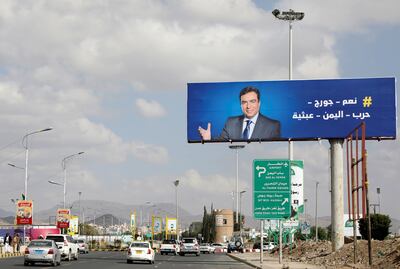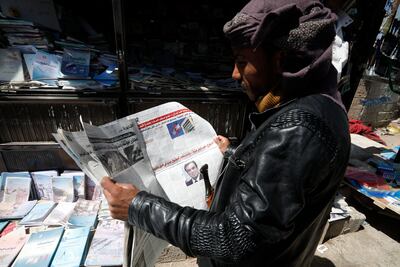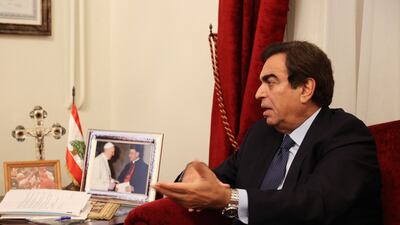A YouTube video circulating widely this week shows Lebanon’s current Information Minister, George Kordhi, expressing great admiration in a 2018 media interview, before he was appointed, for three men: Syrian President Bashar Al Assad, Russian President Vladimir Putin and the leader of Hezbollah, the Shiite political party and militia, Hassan Nasrallah.
“The three men should be man of the year in the Arab world, globally and in Lebanon, respectively. I have no doubt,” said the former popular TV presenter on the Beirut-based pro-Hezbollah channel Al Manar.
To those unfamiliar with his political background, Mr Kordahi seems like a nice, charismatic fellow, and is most famous for hosting the Arabic version of the exciting game show Who Wants to be a Millionaire?
Now, he has sparked a storm that is still gathering against him by defending the Iran-backed Houthi rebels in the ongoing war in Yemen in an online media interview published last week. His statements were explosive enough to make Saudi Arabia, the UAE, Kuwait and Bahrain recall their diplomats from Beirut, and could potentially put the lid on his political career. Mr Kordahi said the Houthis were "defending themselves against an external aggression". A Saudi-led military coalition intervened to prop up the Yemeni government in 2015, after the Houthis seized the capital Sanaa in 2014.
To some degree, Mr Kordahi is seen by critics in Lebanon as an inexperienced or ill-advised politician who is getting the country into unnecessary mischief, as it already struggles to garner regional and international support in the face of an economic crisis that has made its currency all but worthless. Fuel queues stretch for kilometres, and many people receive just two hours a day of electricity from the grid.

But he was also praised for his comments by others, primarily Hezbollah, which followed up with a fierce anti-Saudi polemic and described Mr Kordahi as a “brave and noble man”. “There’s truth,” the Hezbollah statement said, “in what he said about Yemen.”
Hezbollah’s rivals, including the Future Movement of Saad Al Hariri, issued a counter-statement expressing their regret about the escalating crisis, which could corrode the case that Lebanon has been trying to make for strong relations with the Gulf and regional heavyweights like Egypt.
“Hours after Prime Minister Najib Mikati’s statement and his repudiation of the disgraceful speech of Minister of Information George Kordahi against the Kingdom of Saudi Arabia, Hezbollah insists on taking a bellicose stance towards our brotherly countries in the Gulf just to appease its sponsor in Tehran,” the Future Movement’s own statement said.
Surprise, surprise: Mr Kordahi has since tweeted praise for Saudi Arabia, saying that he by no means had bad intentions. But can what’s done be undone? The Houthis have already unfurled a large banner in Sanaa with a portrait of Mr Kordahi and wrote: “Yes George, the Yemen war is a complete mess.”
Mr Kordahi, however, said on Sunday that resigning from the government is out of the question since he made his comments about the war in Yemen in August, before becoming a minister, and that he had no control over the editorial policy of the concerned media outlet, which decided to publish his interview last week.

But there is a larger issue that transcends careless statements made by a minister at this perilous juncture in Lebanon’s history. That is the question of whether or not Lebanon’s cause has lost sympathy and patience in the Gulf, as its chronic and systematic corruption, mismanagement of its economy over the past three decades and misallocation of resources have been an omnipresent fixture on the Arabic and international news recently.
Lebanon’s deadly outbreak of sectarian violence earlier this month – which conjured up images of the 15-year civil war that ended in 1990 with an agreement negotiated in the Saudi city of Taif – threatens to derail the new government’s talks with the International Monetary Fund and foreign creditors before they’ve even begun.
It’s hard to pour billions of dollars into a country over decades to no avail; since successive governments have evidently failed to save Lebanon from one of the worst economic collapses in modern history.
Gulf officials have expressed frustration with the political setup in Lebanon, which has made Hezbollah, Iran’s proxy, the most powerful paramilitary entity in the country.
Saudi Arabia’s Foreign Minister Prince Faisal Bin Farhan Al Saud said on Saturday that the issue is far broader than Mr Kordahi.
"I think it's important that the government in Lebanon or the Lebanese establishment forges a path forward that frees Lebanon from the current political construct, which reinforces the dominance of Hezbollah," he told Reuters in an interview.
Lebanon’s Gulf neighbours are disturbed by off-putting words from a minister, but their exasperation with the failed system in Lebanon is much deeper. The problems are too many to list and the Lebanese people are pushed to the breaking point.


